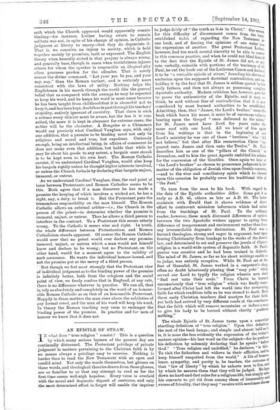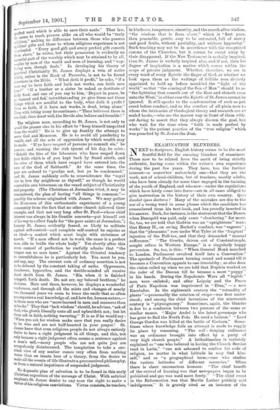AN EPISTLE OF STRAW.
IN what does "true religion" consist? This is a question by which many serious laymen of the present day are continually distressed. The Protestant privilege of private judgment in matters pertaining to the Christian faith is by no means always a privilege easy to exercise. Nothing is harder than to read the New Testament with an open and candid mind. Not only the words themselves, but glosses on those words, and theological theories drawn from those glosses, are so familiar to us that any attempt to read as for the first time seems well-nigh hopeless. Every verse is overlaid with the moral and dogmatic deposit of centuries, and only the most determined effort to forget will enable the inquirer to judge fairly of ." the truth as it,is in- Christ." one for this difficulty of discernment comes frgra the 104 established habit of regarding the New Testament e.-1 one book, and of forcing the *pinions of one writer nae the expressions of another. The great Protestant Luther however, had too much mental sincerity to be able to court., in this common practice, and when he could not blind hitara to the fact that the Epistle of St. James did not, at an rate verbally, coincide with portions of the teaelaings Paul, he cut the book out of the Lutheran Canon and declared it to be "a veritable epistle of straw," founding his dictum a exclusion upon the supposed doctrinal contradiction, and tsp. holding it by the fact that St. James is seldom quoted by the early fathers, and then not always as possessing complete Apostolic authority. Modern criticism has, however, gone far to prove the authenticity of the Epistle, and it may la think, be said without fear of contradiction that it is now considered by most learned authorities to be established Admitting, then, that "James, the Lord's brother," wrote the book which bears his name, it must be of enormous value as bearing upon the Gospel "once delivered to the saints," for St. James must have lived for years under the same roof with our Lord. All we know of him apart from Ilia writings is that in the . beginning of our Lord's ministry he was one of those "brethren" who 'did not believe," but that after His resurrection Christ ap. peared unto James and then unto the Twelve." St. Paul describes him as one of the "pillars of the Church" at Jerusalem, and to him the great Apostle unfolded his scheme for the conversion of the Gentiles. Once again we hear a "the Lord's brother" as chosen to pronounce judgment in the matter of the obligation of Jewish rites upon Gentile converts, —and to the wise and conciliatory spirit which he showed upon this occasion he probably owes his traditional title of "the Just."
To turn from the man to his book. With regard to the date of the Epistle authorities differ. Some put it as early as A.D. 45, others as late as A.D. 60. The latter maintain with Ewald that it shows evidence of direct effort to controvert mistaken inferences which had arisen from the teachings of St. Paul. To the ordinary reader, however, these much discussed differences of opinion between the two Apostolic 'writers appear to spring from difference of temperament and environment rather than from any irreconcilable dogmatic distinction. St. Paul was a learned theologian, strong and eager in argument, bent upon freeing Christianity prom bondage to the works of the Jewish law, and determined to set and preserve the jewels of Christ's religion in a world-wide system of dogmatic faith. St. Paul's genius was creative and he had been trained in dialectic. The mind of St. James, so far as his short writings enable us to judge, was entirely receptive. While St. Paul sat at the feet of Gamaliel, St. James worked in a carpenter's shop, oftenno doubt laboriously planing that "easy yoke" whioh served our Lord to typify the religion wherein men shall "find rest unto their souls." From Christ he learned unconsciously that "true religion" which was finally trans- formed after Christ had left the world into the unwavering faith for which tradition tells us he was stoned to death. Both these early Christian teachers died martyrs for their faith. yet both had arrived by very different roads at the conclusion that the faith which will remove mountains or induce a man to give his body to be burned without charity "profiteth nothing."
The whole Epistle of St. James turns upon a somewhat startling definition of "true religion." Upon this definition the rest of the book hangs ; and simple and almost bald as it is, it is none the less evidently the expression of the writer's mature opinion—his last word on the subject—for he preface' his definition by solemnly declaring that he speaks "before God." "True religion and undeftled," he declares, "15 Skis' To visit the fatherless and widows in their affliction, alla to keep himself unspotted from the world." A life of benevo- lence, sympathy, and purity is, he teaches, the outcome of that "law of liberty" by which he exhorts men to live, and by -which he assures them that they will be judged. He lays down no hard-and-fast rules for a religious life, but simplY ask! his converts to get rid from among them of immorality an excess of frivolity, that they may "receive with meekness the en' word which is able to save their souls." That law, begraftve:ms to teach, presses alike on all who would be "truly elit°as, making no difference between those, who possess d those to whom religious experience is not achaaf."—ed. "Every good gift and every perfect gift cometh cf:,,m above," he writes, but their possession is evidently no ,seatial part of the worship which may be attained to by all, • e by men of the world and men of learning, and " way- f2ring men, though fools." In developing his theory of practical Christianity St. James displays a vein of satire -which, unless in the Book of Proverbs, is not to be found elsewhere in the Bible. "What doth it profit," he asks, "if a man say he have faith and bath not works, can faith save him ?" If a brother or a sister be naked or destitute of ji food, and one of you say to him, Depart in peace, be Tewarmed and fed,' notwithstanding ye give them not those things which are needful to the body, what doth it profit ? Even so faith, if it have not works, is dead, being alone." Then with biting irony he continues : "Thou believest there is one God; thou doest well, the Devils also believe and tremble ! "
The religious man, according to St. James, is not only to avoid the grosser sins in his effort to "keep himself unspotted from the world." He is to give up frankly the attempt to serve God and Mammon. He is to avoid all pandering to wealth, and all the acts of oppression by which wealth may be made. "If ye have respect of persons ye commit sin," he asserts; and warning the rich tyrant of his day, he cries : 'Behold the hire of the labourers who have reaped down your fields which is of you kept back by fraud crieth, and the cries of them which have reaped have entered into the ears of the God of Sabbaoth." At the same time, the poor are ordered to "grudge not, lest ye be condemned," and St. James suddenly calls to remembrance the "royal law to love thy neighbour as thyself," as though he would control his own bitterness on the vexed subject of Christianity and property. (The Christians at Jerusalem tried, it may be remembered, the plan of having "all things in common,"— possibly the scheme originated with James. We may gather the illsuccess of this enthusiastic experiment of a young community from the fact that no other church followed their example, and that not very long after St. Paul—whose chief interest was always in his Gentile converts—put himself out of his way to collect funds for "the poor saints at Jerusalem.") Luxury St. James evidently feared, as likely to militate against self-control—and complete self-control he enjoins as an ideal—a control which must begin with strictness of speech. "If a man offend not in word, the same is a perfect man, able to bridle the whole body." Yet shortly after this stern counsel of perfection he ruefully admits that "the tongue can no man tame." Against the Oriental tendency to untruthfulness he is particularly hot. Yea must be yea, and nay, nay. The current coin of ordinary assertion is not to he debased by the constant taking of oaths. Oppressors, slanderers, hypocrites, and the double-minded all receive short shrift from St. James. "Sin when it is finished bringeth forth death. Do not err, any beloved brethren," he declares. Here and there, however, he displays a wonderful tenderness, and through all the mists and changes of nearly two thousand years we seem to trace the smile that so often accompanies a real knowledge of, and love for, human nature,— in those men who are "more learned in men and manners than in books." They that "lack wisdom" should, he advises, "ask of God, who giveth liberally unto all and upbraideth not; but let them ask in faith, nothing wavering." It is as if he would say : 'When you ask for wisdom make sure that you really desire to be wise and are not half-hearted in your prayer.' St. James knew that even religious people do not always entirely desire to have a right judgment in all things, and this, not only because a right judgment often means a sentence against a man's self,—many people who are not quite just are scrupulously disinterested. The temptation to take a one- sided view of any matter comes very often from nothing Worse than an innate love of a theory, from the desire to make all the events of life illustrate a preconceived philosophy, or from a natural impatience of suspended judgment.
No dogmatic plan of salvation is to be found in this early Christian exposition of the message of Christ. With satirical emphasis St. James denies to any man the right to make a Virtue of his religions convictions. Virtue consists, he teaches, in kindness, temperance, sincerity, and the search after wisdom, "the wisdom that is from above," which is "first pure, then peaceable, gentle, easy to be entreated, full of mercy and good fruits, without partiality, and without hypocrisy." Such teaching may not be in accordance with the recognised canons of the Churches, but it cannot be swept away by their disapproval. If the New Testament is verbally inspired, then St. James is verbally inspired also, and if not, then his degree of inspiration is a matter which comes within the scope of private judgment. Whether, therefore, we see in every word of every Epistle the finger of God, or whether we look upon them as the writings of fallible men divinely appointed to hold up before mankind the "light of the world" so that "the coming of the Son of Man" should be as "the lightning that cometh out of the East and shineth even unto the West," in either case the Epistle of St. James cannot be ignored. It still speaks to the condemnation of such as put creed before conduct, and to the comfort of all plain men to whom the intricacies of theological theory and research are as sealed books,—who see the narrow way in front of them with- out daring to assert that they always discern the goal, but who wait for the time when "faith is made perfect by works" in the patient practice of the "true religion" which was preached by St. James the Just.







































 Previous page
Previous page